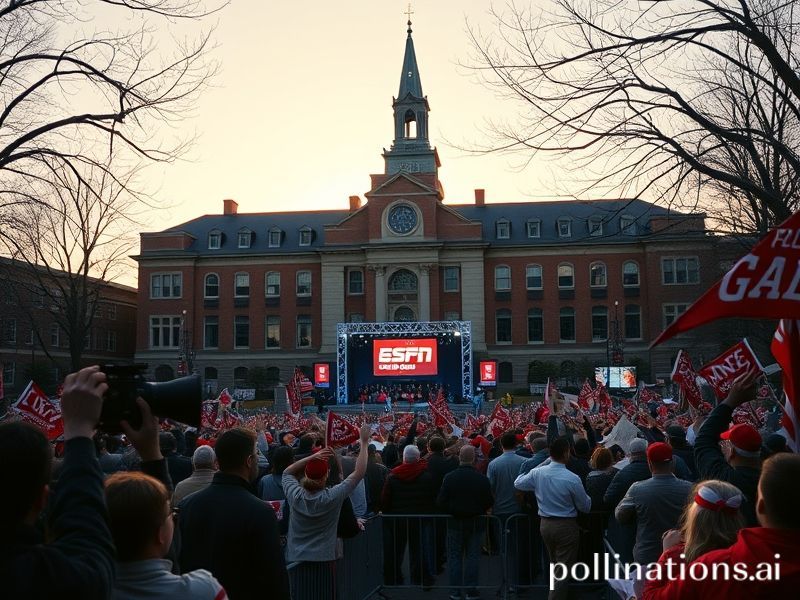Global Eye on America’s Academic Circus: College GameDay Week 4 and the Beautiful Absurdity of Empire
**When the World Watches America Play Dress-Up: College GameDay Week 4 and the Theater of Imperial Decline**
While the rest of the planet grapples with minor inconveniences like climate collapse, food insecurity, and the occasional coup d’état, the United States has once again demonstrated its uncanny ability to transform higher education into a three-ring circus of tribal warfare. College GameDay Week 4 has arrived, and with it, the annual ritual of grown adults painting their faces to match the colors of institutions that will happily saddle their children with six-figure debt.
From our international vantage point—where universities typically focus on quaint concepts like “learning” and “research”—the spectacle unfolding across American campuses presents a fascinating anthropological study. Here, in the waning days of empire, we witness a civilization that has elevated collegiate athletics to the status of state religion, complete with its own liturgy of fight songs, sacred colors, and the holy sacrament of overpriced stadium beer.
This week’s proceedings feature the usual suspects: Alabama’s football industrial complex squaring off against whatever sacrificial lamb they’ve scheduled to maintain their carefully curated dynasty. Meanwhile, across the Atlantic, European universities—those charmingly naive institutions that still believe their primary purpose involves education—watch with the bewildered expression of anthropologists discovering a cargo cult.
The global implications are, of course, staggering. As American students perfect their beer-pong techniques and refine their body-painting skills, Chinese universities quietly produce another generation of engineers and scientists. While SEC fans debate the relative merits of their third-string quarterbacks, India graduates another cohort of computer scientists. It’s a delicate balance: America provides the entertainment, the rest of the world provides everything else.
The economic calculus is particularly exquisite. Universities that cry poverty when asked to pay graduate students a living wage somehow find millions for coaching salaries and state-of-the-art training facilities. It’s a magic trick worthy of David Copperfield: now you see educational funding, now you don’t! Meanwhile, international observers note that the annual budget of Alabama’s football program could probably fund a small nation’s entire university system.
But perhaps we’re being too cynical. After all, College GameDay serves a vital societal function: it provides a controlled environment for Americans to work out their tribal impulses without actually declaring war on each other. The red team hates the blue team, the orange team despises the purple team, but everyone goes home relatively intact. It’s like the Hunger Games, but with better tailgating and fewer fatalities.
The media coverage itself deserves special recognition. ESPN has transformed what could generously be called “amateur athletics” into a multi-billion-dollar content machine, complete with its own language of “College Football Playoff implications” and “quality losses”—a delightful oxymoron that only Americans could invent with a straight face. International viewers, accustomed to sports where the best team typically wins, find this concept utterly mystifying.
As we watch another Saturday unfold—complete with marching bands, cheerleaders, and the ritualistic sacrifice of freshman dignity—it’s worth remembering that this too shall pass. Empires rise and fall, civilizations come and go, but the human need for tribal belonging remains constant. Americans have simply chosen to express this ancient urge through the medium of 18-year-olds in plastic armor smashing into each other for their entertainment.
The world will continue spinning, climate change will continue accelerating, and eventually, the bills will come due. But for now, in this moment, America has its priorities straight: football first, everything else second. It’s a bold strategy for maintaining global relevance. Let’s see how it plays out.







